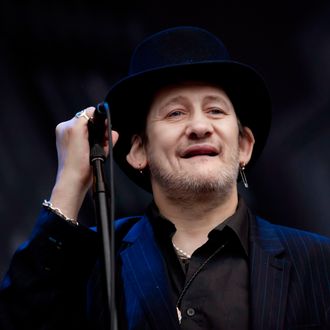
Shane MacGowan, singer of Celtic punk band the Pogues, has died. He was 65. His wife, Victoria Mary Clarke, shared the news on Instagram, writing, “There’s no way to describe the loss that I am feeling and the longing for just one more of his smiles that lit up my world.” A spokesperson told the BBC he died peacefully this morning, surrounded by Clarke and his sister. He had been discharged from the hospital in November, after being hospitalized in June for an infection. MacGowan died just as the song he was best known for, the Pogues’ Christmas hit “Fairytale of New York,” was returning to airwaves for another season.
MacGowan was born on Christmas to Irish immigrant parents in England. He grew up an Irish Republican and punk fan, and he made the news when he was 18 for suffering a bloody ear at a Clash concert. That year, he also joined his first band, the Nipple Erectors. He later met Peter “Spider” Stacy in the bathroom at a Ramones show, and the pair began performing together. As other musicians joined, they named their new band Pogue Mahone in 1982, a variant on the Irish phrase póg mo thóin, which means “kiss my arse.” They performed under that name for a few years, even opening for the Clash in 1984, which led to their signing to Stiff Records — and renaming to something more palatable, the Pogues.
MacGowan recorded five albums with the Pogues, including the Elvis Costello–produced Rum Sodomy & the Lash and their biggest success, If I Should Fall From Grace With God. But by the late ’80s, MacGowan was missing shows and promotional duties due to substance abuse. In 1991, after the release of Hell’s Ditch, he was kicked out of the band. He then formed another group, Shane MacGowan and the Popes, before rejoining the Pogues for their reunion in 2001.
MacGowan’s most beloved work, “Fairytale of New York,” was released in 1987. He claimed he wrote it after a bet with Costello that he couldn’t write a Christmas song. The band recorded it with English singer Kirsty MacColl, and it quickly became a holiday hit, returning to the charts many seasons after. Today, it’s consistently the most popular Christmas song on U.K. radio.


